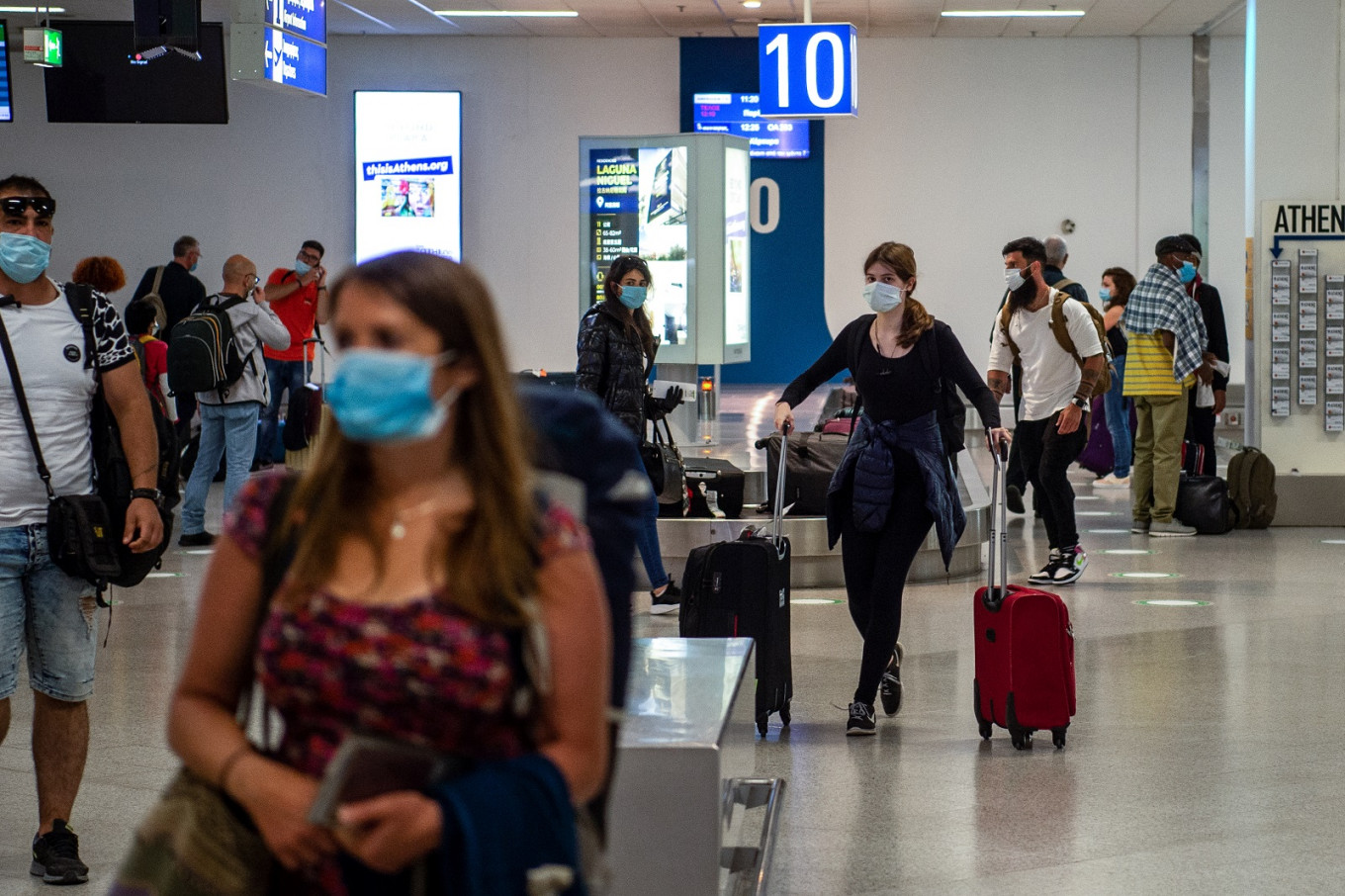‘New normal’ requires tourism players to shift focus

Passengers of a flight from Paris wearing protective face masks arrive at the Eleftherios Venizelos International Airport in Athens on June 15. As the Indonesian government gears up to reopen tourist destinations in the so-called “new normal” phase, tourist industry players are urged to shift their focus to hygiene and safety to lure visitors and mitigate health risks. (AFP/Angelos Tzortzinis)
JAKARTA — As the Indonesian government gears up to reopen tourist destinations in the so-called “new normal” phase, tourist industry players are urged to shift their focus to hygiene and safety to lure visitors and mitigate health risks.
In his speech on May 25, President Joko “Jokowi” Widodo admitted the high risk of reopening the tourism sector after temporary closures to contain the COVID-19 pandemic that has affected tens of thousand people in Indonesia.
The president stressed the importance of the players to focus on hygiene and safety, as those would be among the major considerations for travelers in the future.
Business consultant Grant Thornton Indonesia legal partner Kurniawan Tjoetiar confirmed that the travelers would focus their attention on health and safety after the outbreak.
“Travelers will no longer require low-cost travel but rather [focus on] safety while a vaccine has yet to be discovered,” he said during an online press briefing on May 19.
Given the situation, he said tourism industry players such as airlines and other transportation providers, along with hotels, tourism site managers and restaurants, should find new ways, by ensuring safety and comfort, to lure travelers.
“People may still be afraid of traveling. If they do travel, I think they will not hesitate to pay a premium price just to ensure the safety and comfort of their journey,” said Kurniawan, adding that the new approach would also help them emerge from the blow caused by the COVID-19 pandemic.
A survey by the Pacific Asia Travel Association (PATA) involving more than 1,200 Chinese tourists confirms that health and safety will become the main concern for future travels.
“The tourists surveyed hope that travel agencies and destinations can do a good job of health and safety protection, take necessary measures to ensure the health and safety of tourists,” the finding reads.
The World Travel and Tourism Council (WTTC) also suggests that new standards and protocols for safety might be required for tourist facilities.
Outlining new possible procedures, the WTTC said that, at a hotel, for example, new protocol may include check-in through digital technology, hand sanitizer at frequently visited points and contactless payment instead of cash.
Tourism and Creative Economy Minister Wishnutama Kusubandio said in May that the ministry expected the emergence of a new trend in tourism entering the “new normal” period, with travelers to be more concerned about hygiene, health and safety.
He said the ministry would prioritize domestic tourism during the “new normal”.
Health Minister Terawan Agus Putranto signed on June 19 a decree on health guidelines for public facilities, including hotels, restaurants, shopping malls, fitness centers, convention halls, tourist destinations and public transportation.
In general, such establishments are obliged to provide hand sanitizers in public spaces, clean these areas with disinfectant at least three times a day and maintain proper ventilation by prioritizing fresh air circulation or periodically replacing air conditioner filters.
The decree also provides specific regulations for certain businesses, such as mandatory room disinfection prior to guest check-in and the provision of hand sanitizers in each room for hotels.
Previously, the ministry’s undersecretary for tourism products, Rizki Handayani, said the government was mulling plans to issue certification to ensure compliance of tourist destinations and accommodation providers with health and hygiene standards.
Rizki predicted that visitor management for busy Indonesian destinations, such as world heritage site Borobudur temple in Magelang, Central Java, would be required to maintain a physical distance between tourists.
“If they [the tourists] were okay with going to packed and crowded places, they are not anymore. They will be more aware of the physical and social distancing concept,” she told The Jakarta Post.
Future tourists might also go as far as avoiding transit flights to minimize contact and lower the possibility of transmission, hence direct connectivity to destinations would be preferred in the future, Rizki added.
As people get used to the “new normal”, tourists might also prefer to go to quieter places and opt for nature-based tourism and outdoor activities, Indonesia Travel Agent Association (Astindo) spokesperson Madeleine Sophie also said.
“Places that offer natural tourism, outdoor activity would be the new preference for tourists in the future. In the past, people would only go to Instagram-worthy places, even if they were crowded, but now guests will avoid crowded places,” she said.
The findings contrasted the country’s tourism state before the pandemic, where Tourism Ministry data shows that the majority of foreign tourists visit the country for cultural tourism.
Madeleine also said that tourism products that offered a local wisdom experience, sustainable tourism and culinary experiences would be preferred by tourists after the pandemic. People were also likely to go on vacation in smaller groups or with their family rather than in big groups, she added.
PATA’s survey on Chinese tourists shows that more than half those surveyed choose to relax at the seaside, while the rest would opt for homestay or mountain sightseeing in the future.
For more news about the novel coronavirus click here.
What you need to know about Coronavirus.
For more information on COVID-19, call the DOH Hotline: (02) 86517800 local 1149/1150.
The Inquirer Foundation supports our healthcare frontliners and is still accepting cash donations to be deposited at Banco de Oro (BDO) current account #007960018860 or donate through PayMaya using this link.